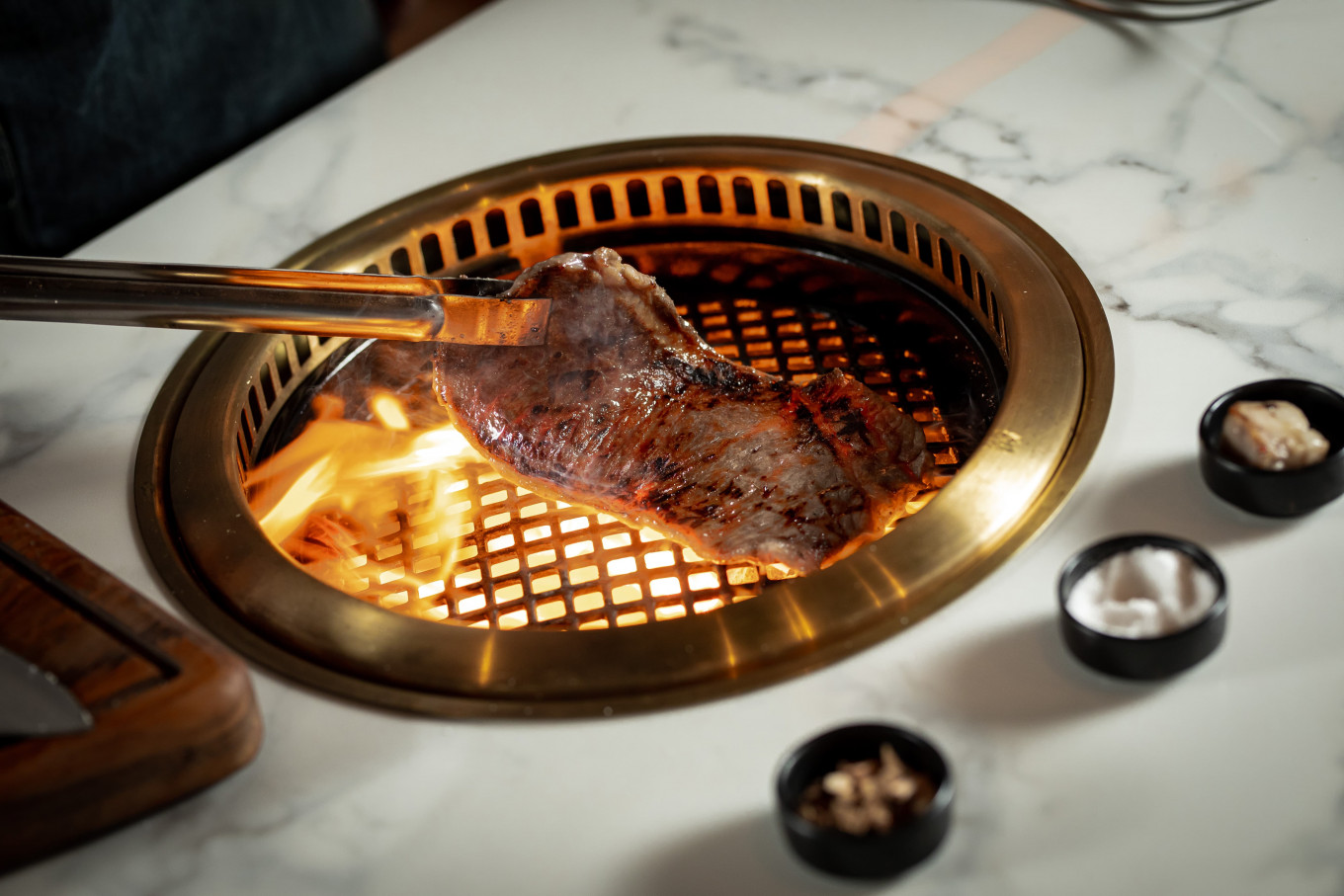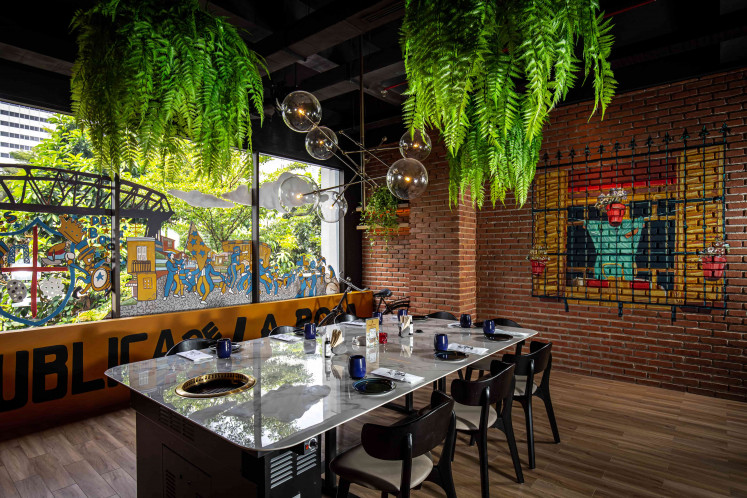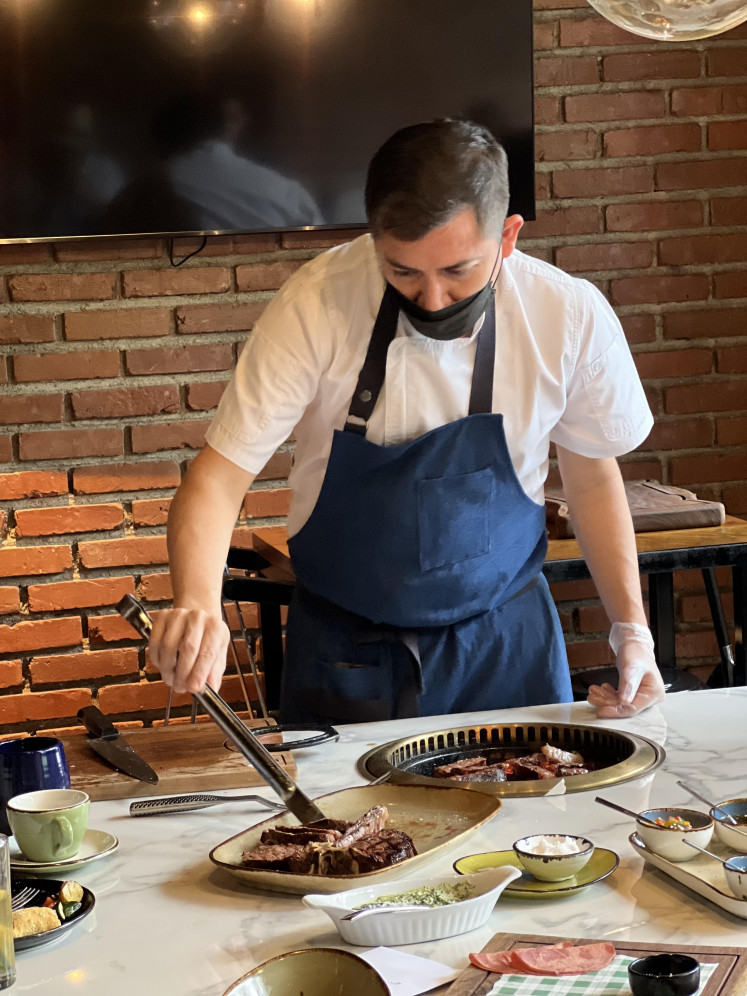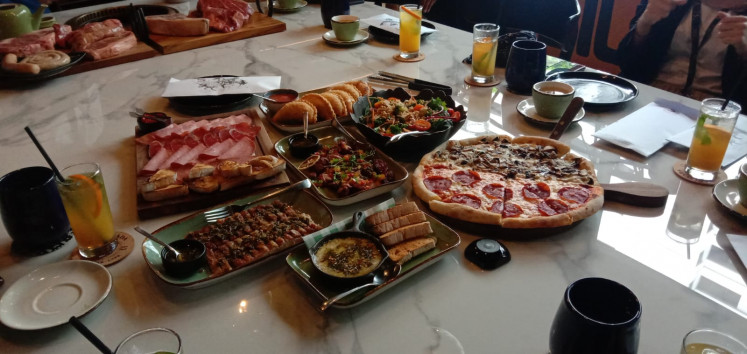Popular Reads
Top Results
Can't find what you're looking for?
View all search resultsPopular Reads
Top Results
Can't find what you're looking for?
View all search resultsSudestada Jakarta offers unforgettable Argentinian food
Change text size
Gift Premium Articles
to Anyone
N
earing its third year as Jakarta’s home of Argentinian cuisine, Sudestada introduces a more infused Argentinian ambience in its new private rooms.
Sitting nicely in the busy neighborhood of Menteng, Central Jakarta, Sudestada is in no way an unfamiliar sight. With the name meaning "powerful wind" in Spanish, it has blown life into Jakarta’s dining scene since 2019 with its Latin American dishes.
Owned by the Argentinian chef Victor Taborda, Sudestada is one of the very few Argentinian steakhouses in Jakarta. Its Latin culinary offerings have been famous among diners in the area due to their authenticity and also the South American atmosphere the place gives off.
This is why, when Sudestada decided to hold a media gathering on March 16 to show off its four private rooms, it seemed like a natural progression; as if its entire culinary crusade to promote Argentinian food had led it to this new, intimate setting where the Argentinian eating culture is even more highlighted.
Argentina's air: The setting of one of Sudestada's private rooms La Boca, which is the name of a neighborhood in Argentina's capital Buenos Aires. (Courtesy of Sudestada Jakarta) (Courtesy of Sudestada Jakarta/Courtesy of Sudestada Jakarta)Deeper into the culture
Similar to other Latin countries, Argentina is home to asado, a traditional event where family and friends gather to enjoy grilled meat delicacies.
Not just another name for a barbeque party, asado also refers to the large section of a cow’s rib cage where the mouth-watering meat cuts come from. This is something that Sudestada is famously known to be good at, providing the finest cuts of asado from rib eye to bife de chorizo.
But with its new private rooms, the place seems eager to promote this tradition in as close a setting as it can be to Argentina’s history and culture. The names of the rooms say it all: La Boca refers to the beloved Buenos Aires neighborhood, Polo pays homage to Argentina’s national sport, Tango comes from the influential Argentina-and-Uruguay-originated dance and El Gaucho is the name of the courageous Argentine horsemen, their animated figures drawn on the room’s walls.
We gathered first in the Tango room, where big red curtains accentuated the space.
“This represents caminito, one of our theaters in Argentina,” chef Victor explained.
Victor also welcomed us by talking about the Argentinian tea-drinking tradition.
“This is part of our culture. But due to COVID, I’m sorry we can’t share,” he said, holding a cup of herbal tea called Yerba Mate. Argentines always drink Yerba Mate with their friends, so the tea is not merely a drink but also a custom. “We are not going to share this with people we don’t know,” he added, already regarding us as friends.
We were served a cold Yerba Mate, something that Victor did not usually drink back in Argentina.
“I’m from the South, and the South is really cold. So we don’t take the cold one,” he shared. “But my wife is from the North where it’s really hot. And they drink this iced tea all the time.”
All of us then moved to have lunch in the La Boca room, the neoclassical décor of which was accompanied by classical guitar songs. All the private rooms have a table-top grill where diners’ meat orders can be grilled or where they can grill their own meat.
“The Asado Argentino is not about a nice presentation of the meat. It’s grill, cut, eat it. That’s it,” Victor said.
But everyone could see that the chef took great care with the presentation of the meat. The cuts were thick and juicy as they met the grill’s blazing flames.
Even though the Argentina native grilled us the meat that afternoon, Victor emphasized that asado was something that everyone can do themselves. Especially because the Argentinian way of grilling the meat is with no marinating whatsoever — only salt.
Smokin’ hot: Victor Taborda, the chef and owner of Sudestada Jakarta, prepares a dish on an open grill during a media gathering on March 16. (Courtesy of Sudestada Jakarta) (Courtesy of Sudestada Jakarta/Courtesy of Sudestada Jakarta)Taste and preference
During the asado lunch, Victor busied himself as the host of the afternoon by serving each person the meat he had just cooked on everyone’s plates.
“Which meat did you like most?” he asked. Some preferred the medium-rare cut of the rib-eye while a few liked the smoky, chewy cut of the T-bone better. All of them were gone in a matter of minutes, a testament to the meats’ quality.
When asked about his signature dish, Victor replied: “You want my favorite or the customers’ favorite?” acknowledging the difference between Indonesians' and Argentines’ culinary tastes.
Still, the chef answered both. The visitors’ favorite Sudestada menu item is the Matambre, a grilled rose meat complete with a chimichurri sauce smothered on top of it — not unfamiliar in its taste and presentation to Indonesian chili-plastered beef, only juicier. Victor’s favorite, on the other hand, is the beef ravioli, full to the brim with tasty beef and tomato.
The appetizers are loaded with various palate pleasers, from the famed Matambre and chimichurri, ham-and-mozzarella empanadas, cold cuts platter, to the fresh spinach and kale salad. Olive oil, mustard and honey are prominent in a lot of the dishes.
Argentinian-style pizza, interestingly, also came as an appetizer. The creamy mushrooms, pepperoni and mozzarella tasted as luxurious as they felt familiar, like one’s favorite street-food meal. In this closely knit atmosphere, Victor talked about the deep connections between Argentinian and Italian culture.
Fully loaded: The extensive appetizers, from the empanadas to the pizza, are pictured during the media gathering for Sudestada's private rooms' launch. (Courtesy of Radhiyya Indra) (JP/Radhiyya Indra)“The difference [between Argentinian and Italian pizza] is that the mozzarella for Argentina’s pizza comes at a cheaper price,” he said. And that eventually became its charm, just like a lot of Indonesian food.
“I quarantined for five days here after coming from Argentina, and what’s the third meal I ordered? Nasi goreng kambing [lamb fried rice],” he said with a grin.
Often some Argentinian dishes, like mollejas (sweetbreads), are compared to the Indonesian version. “This kind of dish in Indonesia is probably jeroan [offal],” Victor said.
Desserts came in the form of the sweetest confections — churros and alfajores (sandwich cookies) with dulce de leche, or the Latin version of caramelized milk — or the most charmingly sour, like the tarta de limon (lemon tart) squashed in a glass.
At the end of the lunch, Victor introduced Sudestada’s pastry chef — and also his wife — Claudia Urbaneja. “She’s the one who makes all our sweets,” Victor said, both of them smiling warmly. Such gestures add to the general closeness that everyone feels eating there.
Sudestada does say in its slogan that we might come as guests, but leave as amigos (friends). And these new private rooms will do a good job at making sure that happens.
Sudestada Jakarta opens every day from 11 a.m. to 9 p.m.














